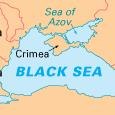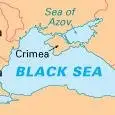(Guest post by Mitat Çelikpala and Dimitrios Triantaphyllou) As 2016 began, global power dynamics and the international security system swung even further toward the unbalanced side of the pendulum. Conditions in Syria and Iraq deteriorated. The relationship between Russia and Turkey worsened. Distrust between Iran and Saudi Arabia increased. The EU grappled with crises of identity and security. Russia reiterated that the United States and NATO are its main security threats.
One area where many of these issues converge is the Black Sea region, where multiple relations are being tested and security structures transformed. For years, stable relations between Moscow and Ankara maintained a certain status quo in regional security. With the destabilization of Russian-Turkish relations, the region is more unsettled and increased militarization exists on all sides.
Is de-escalation and a return to the status quo possible? Can a new format be found for regional dialogue and conflict resolution? Much rests with the two regional heavyweights, Vladimir Putin and Recep Tayyip Erdoğan, and their willingness to abate tensions.
[Also see: Volodymyr Dubovyk, The Implications of the Crimean Annexation for Black Sea Security, May 31]
The Changing Geopolitics of the Black Sea
Russia has seen its influence over the littoral space of the Black Sea shrink considerably. Russia’s CIS, “near abroad,” and Eurasian Union projects have fundamentally failed. Many post-Soviet states in the region which were once inextricably linked now have dreadful diplomatic relations. Armenia and Azerbaijan are at violent odds over Nagorno-Karabakh. Georgia terminated relations with Russia, which occupies the breakaway regions of South Ossetia and Abkhazia. Ukraine and Russia, the two largest Slavic nations, are at war.
Three of the six littoral states are NATO members (Turkey, Romania, and Bulgaria) and two others (Ukraine and Georgia) seek to enhance their relationship with NATO. Arguably, fear of NATO’s growing influence in the region led Russia to violate the territorial integrity of Georgia and Ukraine.
However, Russia’s actions in these countries have only served to strengthen ideational identities—Georgian Europeanness and Ukrainian nationalism.[1] Polling data reflects popular support for NATO among Ukrainians and Georgians. In 2009, only 21 percent of Ukrainians supported NATO accession and 60 percent opposed it. A July 2015 poll showed that 64 percent of Ukrainians now support NATO accession. In Georgia, a February 2015 poll showed that 78 percent support NATO accession.
In Turkey, interestingly, a 2015 public opinion poll on whether or not NATO is relevant found public opinion to be divided: 38 percent of respondents suggested it was relevant, 35 percent said it was not, and 27 percent did not respond. While governments in Romania and Bulgaria have been steadfast in their support for NATO and its activities in the Black Sea, Turkey’s à la carte attitude toward NATO raises questions about the Alliance’s effectiveness in the Black Sea region.
Three Important Factors for Regional Security
There are three factors to consider when it comes to the future of the region’s security. The first is the evident democratic recession across the globe. This trend is occurring in what democracy expert Larry Diamond calls “strategic swing states.” Examples of these are Turkey, Ukraine, and Russia, the three largest in the region, as well as Azerbaijan and Armenia. All these countries have tenuous rule of law and democracy situations.
This is occurring at a time when the EU’s integration experiment is undergoing a compound crisis involving refugees, security, and identity. The EU is trying to clarify the “interests vs. values” debate in its foreign policy as it updates its Global Strategy document which should be released by June. Europe’s foreign policy stance will inevitably have repercussions on Black Sea regional security, particularly for countries like Georgia and Ukraine that have paid a high price for giving up their multi-vector foreign policies in favor of pro-Western orientations.
The third factor is the persistent militarization of the states in the Black Sea region. According to the Global Militarization Index of the Bonn International Center for Conversion (BICC), all Black Sea states possess a high or very high degree of militarization. This is especially so for Armenia, Azerbaijan, and Russia (with the latter providing the bulk of armaments for both of the former).
Given the slide in democracy, EU distraction, and regional militarization, it is important to scrutinize changes in core elements of the regional security framework—maritime and energy security, as well as the region’s unresolved territorial conflicts. Maritime and energy security have been at the core of the Russia-Turkey relationship in the region. As regional powers, they have upheld the status quo. Their relationship has been tested many times but it has not strongly wavered. For example, in the 2008 Russia-Georgia War, Turkey maintained the sanctity of the Montreux Convention in spite of pressures from some NATO allies. The annexation of Crimea in March 2014 also did not fundamentally alter the relationship between the two countries—Turkey downgraded the issue of the rights of Crimean Tatars and it did not join in the U.S. and EU sanctions. Until relatively recently, the relationship between Ankara and Moscow also survived their different interpretations and interests in regard to the Arab Spring, including with regard to the fate of the Assad regime.
The Su-24 Change Agent
Dynamics changed with the Turkish shoot-down of a Russian Su-24 fighter jet in November 2015. This reversed the collaboration between the two countries that had been mutually beneficial for years. After vociferous public exchanges between Putin and Erdoğan about the shootdown, many expected wider implications for the Black Sea security environment.
Russia’s assertive actions brought numerous issues to the surface. Turkey’s strategy of being a regional energy hub and its own energy security were challenged (almost two-thirds of its natural gas imports are from Russia). Turkey had to reconsider its foreign policies in the Middle East. As one astute observer wrote, “While Russia was treating Syria as a beachhead, Turkey was trying to maintain it as a springboard of power and influence projection.” Turkey has since lost a certain leverage, and it has had to deal with new threats, such as the possibility of an escalating proxy war with Russia via the Kurdish PYD and PKK. Their quarrel also put a serious dent in Turkey’s tourism sector, which has been compounded by terrorist attacks, including in Ankara and Istanbul.
In the meantime, Turkey has attempted to jumpstart a partnership with Ukraine. In March Ankara and Kyiv held a high-level Strategic Cooperation Council meeting to explore ways to intensify bilateral ties and promote trade and investment. However, the $4.5 billion in trade between them pales in comparison to the $30+ billion bilateral trade between Turkey and Russia. Such economics undoubtedly contribute to Ankara’s reticence to raise the flag for the Crimean Tatars or go beyond stating that it would never recognize the Russian annexation of Crimea.
What Now?
In the Black Sea region, the mainstays of international order since the end of the World War II—territorial integrity, self-determination, non-intervention in domestic affairs—have been fundamentally challenged. As it challenges the postwar order to which it has been a privileged player, Russia is seeking to rewrite terms, but its terms are not clear. By widening its theater of action to the Middle East, it also began to push Turkey to reconsider its regional priorities.
There seem to be two, not entirely fulfilling, options moving forward: 1) de-escalation and reaffirmation of the status quo between Moscow and Ankara or 2) a redefinition of the security agenda, which involves deepening divisions including further NATO enlargement.[2] The first option would require Ankara and Moscow to ignore a host of growing divergences in order to ensure shared dominance of the region. The second option entails a Turkish recognition that Moscow’s anti-Western discourse is more than just rhetoric. Neither option, however, prioritizes what is really needed: new mechanisms to avert unintended conflicts that can further destabilize regional security.
Mitat Çelikpala is Professor and Dean of the Graduate School of Social Sciences at Kadir Has University, Istanbul.
Dimitrios Triantaphyllou is Associate Professor and Chair of the Department of International Relations, and Director of the Center for International and European Studies, at Kadir Has University, Istanbul.
This comment is derived from a PONARS Eurasias workshop held in Istanbul, February 4-6, 2016.
[1] See: Volodymyr Kulyk, ”One Nation, Two Languages? National Identity and Language Policy in Post-Euromaidan Ukraine,” PONARS Eurasia Policy Memo No. 389, September 2015.
[2] See: Dimitrios Triantaphyllou, “Time for daring in an age of ambivalence: Making the case for NATO membership for Georgia and Ukraine,” Defensematters.org, September 21, 2015.
Also see:
Volodymyr Dubovyk, The Implications of the Crimean Annexation for Black Sea Security, PONARS Eurasia Commentary, May 31, 2016











